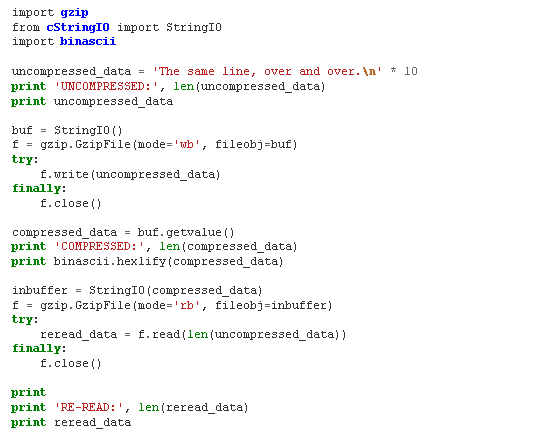python利用gzip压缩解压缩Str
发布时间:2019-08-12 09:52:11编辑:auto阅读(2185)
When working with a data stream instead of a file, use the GzipFileclass directly to compress or uncompress it. This is useful when thedata is being transmitted over a socket or from read an existing(already open) file handle. A StringIO buffer can also be used.

Note
When re-reading the previously compressed data, I pass an explicit length toread(). Leaving the length off resulted in a CRC error, possibly becauseStringIO returned an empty string before reporting EOF. If you areworking with streams of compressed data, you may want to prefix the data withan integer representing the actual amount of data to be read.
我按照他的方法,自己写了一下:
>>> import gzip
>>> from cStringIO import StringIO
>>> puredata = 'test'
>>> buf=StringIO()
>>> f=gzip.GzipFile(mode="wb", fileobj=buf)
>>> f.write(puredata)
4
>>> f.close()
>>> cdata = buf.getvalue()
>>> print cdata
ヒ
>>> print len(cdata)
24
>>> import binascii
>>> print binascii.hexlify(cdata)
1f8b0800e0a3ab4f02ff2b492d2e01000c7e7fd804000000
>>> inbuffer = StringIO(cdata)
>>> f = gzip.GzipFile(mode="rb", fileobj=inbuffer)
>>> rdata = f.read()
>>> print rdata
test
成功
之前压缩完了之后总是解压缩不成,提示:
IOError: CRC check failed 0xab380008L != 0x0L
后来发现没有调用f.close(),加上之后就好了
上一篇: Python 2.7 和 Python
下一篇: python:链表定义以及实现
- openvpn linux客户端使用
51283
- H3C基本命令大全
50735
- openvpn windows客户端使用
41333
- H3C IRF原理及 配置
38144
- Python exit()函数
32611
- openvpn mac客户端使用
29513
- python全系列官方中文文档
28364
- python 获取网卡实时流量
23233
- 1.常用turtle功能函数
23199
- python 获取Linux和Windows硬件信息
21526
- Python搭建一个RAG系统(分片/检索/召回/重排序/生成)
1597°
- Browser-use:智能浏览器自动化(Web-Agent)
2327°
- 使用 LangChain 实现本地 Agent
1930°
- 使用 LangChain 构建本地 RAG 应用
1870°
- 使用LLaMA-Factory微调大模型的function calling能力
2200°
- 复现一个简单Agent系统
1913°
- LLaMA Factory-Lora微调实现声控语音多轮问答对话-1
2600°
- LLaMA Factory微调后的模型合并导出和部署-4
4368°
- LLaMA Factory微调模型的各种参数怎么设置-3
4213°
- LLaMA Factory构建高质量数据集-2
2991°
- 姓名:Run
- 职业:谜
- 邮箱:383697894@qq.com
- 定位:上海 · 松江
